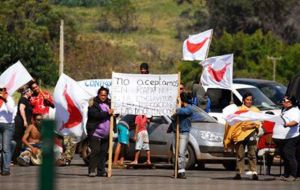MercoPress. South Atlantic News Agency
Distribution of land deeds among locals defuses conflict in Chile’s Easter Island
 Rapa Nui indigenous clans fear an influx of ‘aliens’ and threat to environment
Rapa Nui indigenous clans fear an influx of ‘aliens’ and threat to environment Chile’s Interior Ministry Undersecretary Rodrigo Ubilla announced this week that more than 30 Easter Island title deeds will be delivered to Rapa Nui families within the next 60 days.
The announcement is expected to put an end to two months of demonstrations and conflict on the island that included the take over of several publicly owned buildings by families of Easter Island’s original inhabitants, the Rapa Nui indigenous group.
The conflict was initially sparked when President Sebastián Piñera appointed Pedro Edmunds Paoa as provincial governor of Easter Island in March. Edmunds’ appointment caused controversy among the Rapa Nui when it was discovered he planned to sell land plots on the island to non-indigenous people. Edmunds later resigned and was replaced with Carmen Cardinali Paoa.
These events sparked concerns by local inhabitants that non-native people may eventually own much of the island, that land ownership titles be updated and clarified, and limitations imposed to contain the influx of non-natives as residents (and thus avoid its overpopulation and environmental destruction).
On Aug. 6, the government issued a proposal to resolve the conflict, prompting discussions and setting a 60-day deadline for finding possible solutions to land issues, to the protestors’ petition for special status for the island and to their request for immigration restraints.
“The decision to regulate these lands came about, decrees were signed and we shared the news with families,” Ubilla said. “They are very happy about this situation.”
Alberto Tepihi, one of the beneficiaries of new land titles, said he was surprised and cried “when the secretary included my name among the beneficiaries.
”
Despite the government’s claim that the conflict had ended, some 36 clans are still occupying land, insisting the government has failed to resolve their claims to ancestral lands.
The Hito clan, for example, is still occupying the Hanga Roa Hotel. “The occupation of land will continue because the only achievement of the government was to hasten the delivery of title deeds the Vaitea Fundo area of the island, a situation that has nothing do with the issue of ancestral land,” said Marisol Hito, a spokesperson for the clan.
He did not rule out a hunger strike by families to press for further solutions.
In related news, the board of the Association of Archaeologists in Chile called on the authorities to meet the demands of the Rapa Nui people regarding the land issue.
Andrea Seelenfreund Hirch, an archaeologist at the Universidad de Chile and professor at the University Academy of Christian Humanism, said, “At this stage Chile needs new regulations in its treatment of the Easter Island community and its heritage.”
Meanwhile, Leviant Araki, the Rapa Nui Parliament’s president, called for the withdrawal of the contingent of Special Forces (armed police) on the island.
“These first 36 titles will later be joined by others,” said Raúl Celis, governor of the Valparaiso Region (V), which includes Easter Island. “If the government fulfils its part, hopefully the clans will suspend the land occupations.
By Dominique Farrell – Santiago Times




Top Comments
Disclaimer & comment rulesCommenting for this story is now closed.
If you have a Facebook account, become a fan and comment on our Facebook Page!